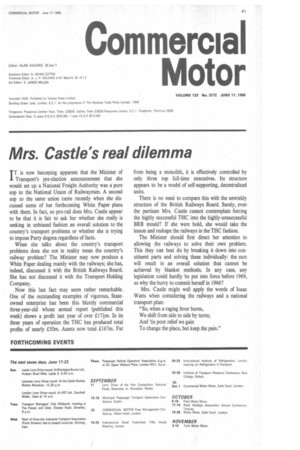Mrs. Castle's real dilemma
Page 43

If you've noticed an error in this article please click here to report it so we can fix it.
IT is now becoming apparent that the Minister of Transport's pre-election announcement that she would set up a National Freight Authority was a pure sop to the National Union of Railwaymen. A second sop to the same union came recently when she discussed some of her forthcornitig White Paper plans with them. In fact, so pro-rail does Mrs. Castle appear to be that it is fair to ask her whether she really is seeking in unbiased fashion an overall solution to the country's transport problems or whether she is trying to impose Party dogma regardless of facts.
When she talks about the country's transport problems does she not in reality mean the country's railway problem? The Minister may now produce a White Paper dealing mainly with the railways; she has, indeed, discussed it with the British Railways Board. She has not discussed it with the Transport Holding Company.
Now this last fact may seem rather remarkable. One of the outstanding examples of vigorous, Stateowned enterprise has been this bluntly commercial three-year-old whose annual report (published this week) shows a profit last year of over £171m. In its three years of operation the THC has produced total profits of nearly £50m. Assets now total £167m. Far from being a monolith, it is effectively controlled by only three top full-time executives. Its structure appears to be a model of self-supporting, decentralized units.
There is no need to compare this with the unwieldy structure of the British Railways Board. Surely, even the partisan Mrs. Castle cannot contemplate forcing the highly successful THC into the highly-unsuccessful BRB mould? If she were bold, she would take the lesson and reshape the railways in the THC fashion.
The Minister should first direct her attention to allowing the railways to solve their own problem. This they can best do by breaking it down into constituent parts and solving these individually: the sum will result in an overall solution that cannot be achieved by blanket methods. In any case, any legislation could hardly be put into force before 1969, so why the hurry to commit herself in 1966?
Mrs. Castle might well apply the words of Isaac Watts when considering the railways and a national transport plan: "So, when a raging fever burns, We shift from side to side by turns; And 'tis poor relief we gain To change the place, but keep the pain."




















































































































































